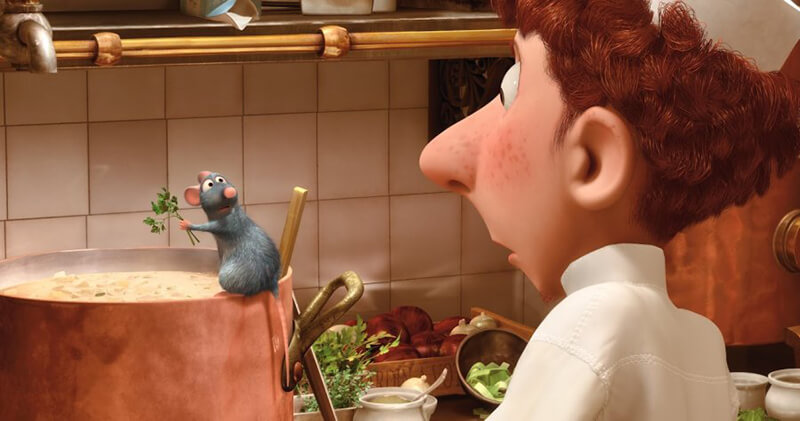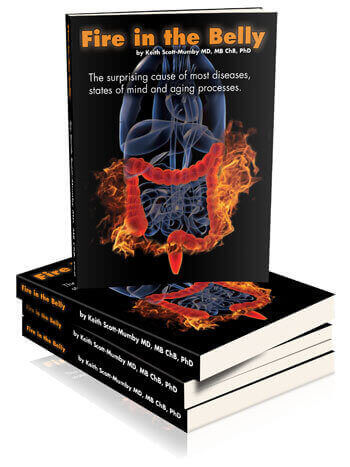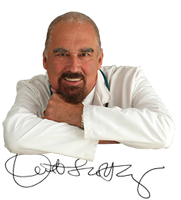You’ve read it before, not just from me: our intestines act as a second brain. This is real, not a metaphor. In fact over 80% of the body’s serotonin is found in the gut, not the brain.
Scientists already know that brain and gut influence each other. In humans, patients with psychiatric disorders have different populations of gut microbes compared to microbes in healthy individuals, with parallel findings also seen in animal models of psychiatric disease. Humans do not all react identically to the same stresses—some are more vulnerable than others to developing psychiatric disorders, others are more resilient.
It may be going too far to suggest that the gut thinks for us too… or it is?
Truth is, we are just learning the basics. But we do have a lot of clues in our language: “I’m fed up” (miserable); “My gut feeling tells me…”; “My stomach flipped over with fright” and so on.
Now here’s an interesting piece of science to suggest our guts may indeed tell us how to feel and think. I’m talking about the gut microbiome. If that’s unhappy, we are unhappy. Crazy as it sounds, tests showed that if microbiota from stressed or depressed rats is transplanted into peaceful, unruffled rats (naïve rats, so-called), then the recipient animals get depressed WITHOUT ANY OTHER APPARENT CAUSE.
Obviously, we are not ready to do that with humans yet. But a study just published from the Stress Neurobiology Program at Children’s Hospital of Philadelphia, followed the action in rats. Researchers showed that transplanting gut bacteria, from an animal that is vulnerable to stress into a non-stressed animal, can reproduce the vulnerable behavior in the recipient.
If it applies to humans, this is an incredible step forward in our understanding of moods, behavior and psychological disturbance. Maybe therapist ought to be talking to our gut bacteria, not the brain end of things!
Far fetched? Less than two centuries ago it was considered ridiculous that we could put a person to sleep during an operation and he or she not feel a thing!
Just beware: if you call someone a shit, you might offend that fecal matter in someone’s intestines! (don’t write to me, it’s a joke…)
So What Did The Scientists Do?
First, they found that stress alters the microbiome. So that removes any doubt that our guts are “tuned in” to what we are thinking and doing. Then they reversed it by showing that what our microbiome is thinking and doing will affect how we feel in our mind!
The major sources of stress in rats, apparently, are social hierarchies and territoriality (did anyone see that funny 2007 animated movie Ratatouille? A rat with a superior palate and exceptional sense of smell is revolted by the food rats are supposed to eat and, in a very funny story line, rises to be one of the top chefs in Paris, hidden in the hat of a young boy and telling him what to do!)

Ratatouille
In the study I’m commenting on, laboratory rats were made to do unpleasant things, like a forced swim test (no way of escaping, till relieved by the scientists) or a “social defeat” test. Some of the rats were rather passive and did not cope well, showing signs of anxiety or depressive-type behaviors. Other rats were more resilient and coped well with social stress. Moreover, the stressed animals showed clear signs of brain inflammation.
Based on these responses, the researchers classified the animals as either vulnerable or resilient.
The study team then analyzed the fecal microbiomes of vulnerable rats, resilient rats, a non-stressed control group, and a placebo group. They found that vulnerable rats had higher proportions of certain toxic bacteria, such as Clostridia, than the other groups.
So stop right there: if you suffer from anxiety states or low mood, you are actually changing your microbiome. You could be wasting your money in hopefully swallowing probiotics and then walking around grumpy or tense! Wow!
Fecal Transplants
The scientists then started swapping around fecal matter from one group of animals to another, a technique with the icky name of “fecal transplanting”.
They performed fecal transplants from three donor groups—vulnerable rats, resilient rats and control non-stressed rats—into naïve rats, that is, animals that had not been stressed.
They found that different microbiomes changed moods and behavior in the recipient animals. Naïve rats receiving transplants from vulnerable rats were more likely to adopt depressive-like behaviors, whereas rats receiving transplants from resilient animals or non-stressed animals did not exhibit any negative changes in behavior or show any neural inflammatory changes.
Curiously, the depressive behavior transferred very significantly, where as anxiety, not so much. And in my opinion, that’s where the study was most interesting and revealing. Based on this evidence, the researchers concluded that depressive states are related to gut/microbiome changes whereas anxiety is really overstimulation of the nervous system. Different organ. Probably different mechanisms.
Dr. Seema Bhatnagar, Ph.D., a neuroscientist in Department of Anesthesiology and Critical Care at Children’s Hospital of Philadelphia (CHOP) and lead scientists in the rat study was led to comment:
“Although much more research remains to be done, we can envision future applications in which we could leverage knowledge of microbiome-brain interactions to treat human psychiatric disorders,” said Bhatnagar. “People already are taking over-the-counter probiotics as supplements. If we can eventually validate beneficial behavioral effects from specific bacteria, we could set the stage for new psychiatric treatments.”
Or, as I suggested, psychotherapists of the future could do their work by putting their head to the patients abdomen and saying, “You lot in there, it’s time for a change!” (just kidding)
What Can We Learn?
Well, if you haven’t got it by now, realize that we are a WHOLE organism; “Planet Human”, as I call it in my book FIRE IN THE BELLY
 In truth we are a vast flourishing organism that is self-organizing, self-correcting and healing—and to mess it up with chemicals such as pharma drugs is never (or hardly ever) going to do any good. Neither is smashing it up irreversibly (surgery), except in very extreme circumstances.
In truth we are a vast flourishing organism that is self-organizing, self-correcting and healing—and to mess it up with chemicals such as pharma drugs is never (or hardly ever) going to do any good. Neither is smashing it up irreversibly (surgery), except in very extreme circumstances.
It is disastrous scientifically and philosophically to study humans by splitting them up into little bits (like “coronary artery”, “mitochondria”, “liver cells” or “pancreas”) and it misses the point completely, thus starting out on a path more likely to produce harm than healing. We are NOT a collection of parts. We are a whole!
We are a complete slew of flowing energies, swirling and responsive, around a visible mass of matter or “stuff” that we call a body, where every part influences the whole, yes, but the whole influences every part. If only doctors could grasp that last bit, we’d have a decent science of medicine.
Good luck on your health quest!

Prof. Keith Scott-Mumby
The Official Alternative Doctor
www.alternative-doctor.com
SOURCE:Transplanting gut bacteria alters depression-related behavior, brain inflammation in animals, Medical Express, May 7 2019,
